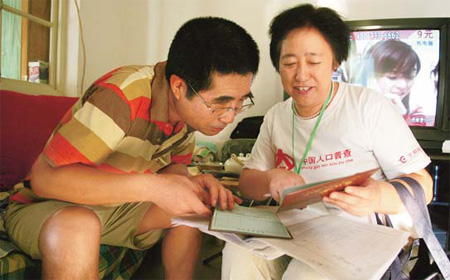News
Fears over privacy confront census takers
By Lu Chang (China Daily)
Updated: 2010-09-06 09:11
 |
Large Medium Small |
|
 Zhang Yanhua, right, a census taker in Beijing, checks household information with a resident in Shijia neighborhood in downtown Beijing. Cui Meng / for China Daily |
Housing headache
One of the biggest puzzles authorities hope the census will solve is to clarify the number of empty apartments across China.
Although opinions differ on the definition of vacant homes and some residents may not be willing to reveal personal details, authorities will still try to get more information on vacant houses through the census, Ma Jiantang, director of the National Bureau of Statistics, was recently quoted as saying by Xinhua News Agency.
Xing in Beijing said that the census does have questions related to housing but it will not provide an accurate vacancy rate.
"The population census only aims to check people's registrations and living conditions," he said.
For people who have been unhappy with the lack of official information on national vacancy rates, the census was viewed as a potential illuminating source. Many experts have called for a tax on vacant homes to curb speculation as some investors hoard large numbers of properties to cause prices to rise.
As housing prices soared in major cities such as Shanghai and Beijing (recent government measures have helped cool the market), concerns over vacancy rates were rampant.
|
 |
The total area of unsold housing across the nation was almost 192 million square meters as of June 30, representing a 6.4 percent year-on-year increase, showed data released on Aug 4 by the National Bureau of Statistics.
The absence of accurate figures has led many to investigate the exact number of apartment buildings in China that are empty.
Zhang Jinqiu and Meng Bin, two professors at Beijing Union University, conducted a survey on electricity consumption in more than 50 residential areas in the capital between 2004 and 2006. They found that 27.2 percent of electricity meters in apartment buildings did not register any usage in 2007.
The survey, which does not include unsold properties, was based on a two-month investigation in the summer, said Zhang Jinqiu. (If consumption for a regular house was less than 10 kilowatts per hour, it was considered empty.)
Other direct methods by the two, such as reading water meters and counting unlighted rooms in the evening, also provided similar results.
Feng Ke, director of Peking University's financial properties research center, said complicated methods are not needed to determine vacancy rates, which can be roughly estimated by reading meters from water and electricity companies.
"It is only a matter of time before a housing survey is conducted, since there is no reliable data to reflect a real picture of the real estate sector," he said. "Without accurate figures, the government will not be able to know how to make a policy."
Beijing's Chaoyang district government recently released housing vacancy figures, the first of its kind in China, saying that 1.33 million square meters of residential space is vacant. More than half of the space has been empty for at least three years.
However, officials did not explain how the survey was conducted and failed to make the distinction between unsold housing and unoccupied homes after sales.
Eric Jou and Hu Haiyan contributed to this story.